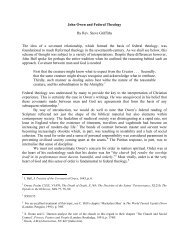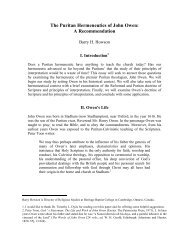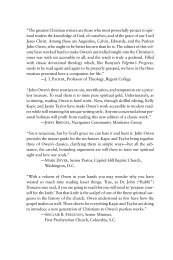M.TH. LONG DISSERTATION (LD6.1) - John Owen
M.TH. LONG DISSERTATION (LD6.1) - John Owen
M.TH. LONG DISSERTATION (LD6.1) - John Owen
Create successful ePaper yourself
Turn your PDF publications into a flip-book with our unique Google optimized e-Paper software.
<strong>John</strong> <strong>Owen</strong>’s Theological Context<br />
This analysis of <strong>Owen</strong> also offers a strand of evidence that further undermines<br />
the ‘Calvin against the Calvinists’ thesis which, as we have seen, asserts that the later<br />
Reformed theologians start with the decrees and work deductively from there, in the<br />
process losing Calvin’s Christ-centred, biblical approach. Yet <strong>Owen</strong>’s treatment of<br />
justification is profoundly Christ-centred. Although the process of justification is<br />
governed by God’s will, it nevertheless focuses on Christ through the pactum salutis,<br />
Christ’s satisfaction, and the need for union with him in order to receive his benefits.<br />
<strong>Owen</strong> could have moved Christ from the centre of his system, either by arguing that<br />
Christ did not purchase faith, it being self-generated by the believer, or by arguing that<br />
faith, once purchased, is applied without explicit reference to Christ. Had he done so,<br />
then other problems for his system would have arisen – relating to the particularity and<br />
unconditionality of redemption on the one hand, and to the inseparable operation of the<br />
members of the Trinity on the other – but the precise set of difficulties faced by his<br />
theology as it stands would have been resolved.<br />
Arguably, Baxter’s accusations of eternal justification, and <strong>Owen</strong>’s complex<br />
description of the application of Christ, in which he distinguishes types and moments of<br />
union and stages of justification, stem from <strong>Owen</strong>’s determination to be Christ-centred<br />
at every point. They do not arise from the problems of a deductive, decretal system.<br />
Indeed, as we have seen, although some Reformed theologians did work ‘logically’ to the<br />
doctrine of eternal justification from the decree to elect in Christ, <strong>Owen</strong> rejects this<br />
move. A significant part of his rejection is his use of the analogy of Scripture, whereby<br />
he refuses to allow a mistaken conclusion drawn from one Scripture doctrine to override<br />
another Scriptural truth. Thus, whether or not his doctrine of justification proves<br />
satisfying at every point, it cannot be condemned for being decretal at the expense of<br />
61





